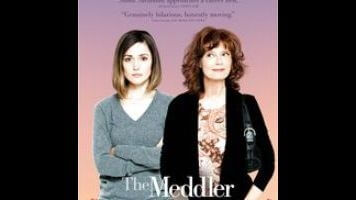The Meddler gives Susan Sarandon a surprisingly great role

Marnie (Susan Sarandon) often begins sentences with “anyway,” even when there’s no previous sentence to digress from—especially on phone messages for her daughter, Lori (Rose Byrne). This should be confusing, but spending some time with Marnie brings clarity to her tic; even if she hasn’t spoken to her daughter in hours or days, Marnie is engaged in an ongoing, and never-ending, conversation. And if she hasn’t spoken to her daughter in hours or days, she’ll have left four or five voicemails continuing the conversation without her.
Contained in The Meddler are the ingredients for a standard-issue comedy about a parent without boundaries, right down to the generic title. Technically, “meddler” describes Marnie perfectly. She has moved to Los Angeles to be closer to her daughter, and she offers recommendations, advice, favors, matchmaking, and bagels—always bagels. When Lori tell her she needs a hobby and she responds with “Maybe you could be my hobby,” the lack of self-awareness is breathtaking. Lori has clearly been her primary hobby for years if not decades.
Yet much of Marnie’s behavior doesn’t really register as meddling, per se, and much of The Meddler doesn’t really register as a chintzy comedy about a grown parent who embarrasses her kid but learns to give her some autonomy, and the kid blows up at her mom but learns that she means well. Things like this do happen in writer-director Lorene Scafaria’s film, but Scafaria and Sarandon have also made a nuanced portrait of a familiar character type. Marnie is doting and prone to unannounced visits, but she’s far from dumb, and her advice isn’t always misguided. She’s sweet and lightly exasperating in a way that plenty of viewers will recognize from real life.
She’s also the movie’s protagonist; the movie has only a handful of scenes that originate strictly from Lori’s point-of-view. Rather than escalating the mother-daughter tension endlessly, Scafaria acknowledges that the daughter is not, in fact, powerless in the face of Marnie’s meddling. In the middle of the movie, Lori, a TV writer, heads back to New York (where Marnie grew up) to be on set for the filming of her pilot. Though Marnie does visit her at one point, this isn’t a movie about a mom stalking her daughter across the country with zany results. When her daughter avoids her, Marnie plays a surrogate-parent role for Lori’s friend Jillian (Cecily Strong), as well as for Freddy (Jerrod Carmichael), an Apple Store employee who has shown a gentle patience that her daughter often lacks. Marnie also regards potential suitors (one played by Michael McKean, another by J.K. Simmons) with a caution suggesting that her meddling may really count as a hobby—one that distracts her from the still recent-seeming loss of her husband.
The Meddler isn’t often laugh-out-loud funny, but it’s a lot more amusing than Scafaria’s previous film, Seeking A Friend For The End Of The World. Reporting that a movie is funnier than an apocalypse may sound like faint praise, but Seeking A Friend did try its hand at dark and whimsical comedy in the midst of disaster, and that stuff mostly didn’t work. Here Scafaria makes nice use of her widescreen frame, and cuts the movie together crisply—a lot of the jokes actually come from the cuts, and the way they punctuate the often pitch-perfect dialogue.
The film does go on a little long; a scene where Marnie cooks and eats egg-in-a-basket, for example, provides a lengthy grace note that it doesn’t particularly need, and Scafaria winds up with more characters than she really knows what to do with. (Maybe the film could have kept Lori’s action-hero movie-star ex as an offscreen presence, instead of trying to sell poor Jason Ritter in that part.) But The Meddler does successfully untether itself from formula, and gives Sarandon a surprisingly great role in the process. She doesn’t get a lot of obvious emotional fireworks. But in scenes where she makes safety plans in the wake of local news reports about a serial killer (“call me when you leave the house, then text me when you get home”) or convincingly praises one of the worst recent Beyoncé songs (“I Was Here”), she may be doing something harder—playing a meddling mom without resorting to caricature.